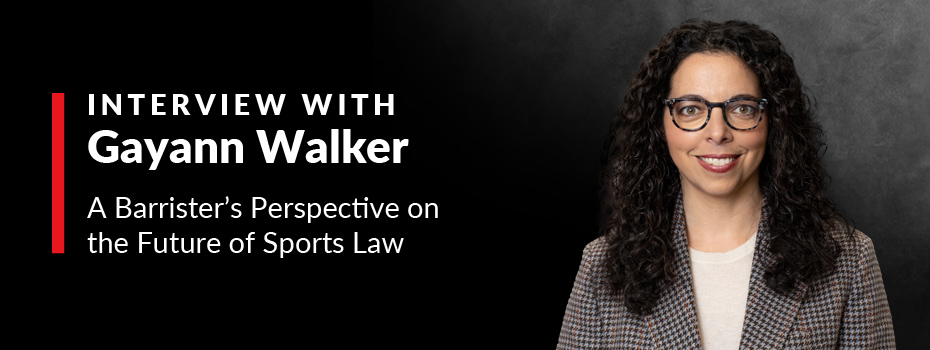
Interview with Gayann Walker: A Barrister’s Perspective on the Future of Sports Law
22 November 2023 12:30
This is an interview with Gayann Walker, an editorial panellist on our Sports Law Bulletin. Gayann is a barrister at the Victorian Bar where she specialises in (among other practice areas) matters relating to sports law. Gayann is also a Tribunal Member with Football Victoria and a former Board member of the Southern Football Netball League. Throughout the interview, Gayann provides some insight into the practice of sports law and the key areas of interest that are currently developing in that space.
This articles comes from the experts behind the Women’s Edition of the Sports Law Bulletin. The bulletin covers the latest Australian and international developments and current thinking on sports law issues. This newsletter and its carefully curated content enables busy practitioners to keep abreast of developments in the law.
Question 1: Sports law is a fairly niche field of legal practice. What was your path to becoming involved in the field? What drew you to it as an area of practice?
A: It is quite niche. Very few counsel practice sports law full time, and it can be considered a “bolt-on” area of practice. I consider myself lucky to have done so much of it in my 3 ½ years at the Bar.
While niche, sports law touches on so many other areas of law, so being a bit of a generalist can assist. Generally, you work within a regulatory framework of the sporting code (and much work, such as Tribunal hearings, anti-doping and regulatory prosecutions, operate in that space). Occasionally, I have dealt with matters outside the box including preliminary discovery in a sporting context, historic allegations of a sexual nature, or a coronial inquest. It can keep you on your toes, and I love it because I am simultaneously applying my experience and always learning.
My path into sports law involved networking, persistence and hard work. Not having grown up in Victoria, I have worked diligently to build a network of colleagues in this space. The Victorian Bar also has a Sports Law area so I have an in-built support system of eminently qualified counsel. This network led to my first gig assisting in an AFL Tribunal matter. This role, in turn, ultimately led to an anti-doping matter. The process has continued from there, and I’ve been able to build my practice from AFL to include various community sports, including cricket, horse racing, greyhound racing and tennis.
I initially was drawn to the area because I thought it would be fun. I was right. While the time pressures can be brutal, some of my most enjoyable matters have been in sport-related matters.
Question 2: What would a typical workday look like for you as a sports law practitioner?
A: This is a difficult question because the matters that cross my desk can be varied. One day I might be asked to assist with an investigation or review, which tend to be very planned out, methodical and the pace is somewhat self-determined depending on the timeline of the client. Anti-doping litigation is similar in that it tends to follow a standard structure of programming as well. If I am working on those types of matters, my day would look very much like a day when I am practicing in any of my areas.
What can be the most challenging are times when a client comes to you with an urgent matter. It might be seeking an injunction to allow a player to play, or a tribunal matter that needs to be heard and determined prior to the next match. In those instances, once you have the brief, it is all systems go and other work needs to be reprioritised. It takes savvy planning and time management skills to receive a handball (pun intended) matter like this and run with it.
Question 3: Have you worked on any particularly interesting cases that you would be able to tell us a bit about?
A: One highlight that stands out was the 2022 appeal of the AFL Tribunal for Carlton Football Club captain, Patrick Cripps. He was suspended for the final 2 weeks of the AFL home and away season when it was vital for Carlton to win one of those games to play finals. The Tribunal upheld the suspension, and I got the call to help out.
As junior counsel, I assisted in drawing the appeal points and drafting submissions. This was one of those matters I spoke of where the deadline was tight. I had to work very quickly and efficiently, and I did not sleep much in the 2 days leading up to the hearing.
People who follow Australian Rules Football might recall this was a real marathon, but the errors of law we raised required very detailed argument about what occurred at the first instance tribunal hearing. After over 4 hours of argument (from my wonderful leader Chris Townshend KC) plus deliberation, the Tribunal upheld the appeal and Cripps was available for team selection. The team were rapt with the outcome.
Unfortunately, Carlton famously lost the last two games of the season and did not play finals, however, Patrick did go on to win the Brownlow medal that year. I was very proud to be a part of that outcome, and my friends joke with me telling me I won the Brownlow. While I will never know what it feels like to win a Brownlow, I reckon the elation I had from the win on the night was similar.
Question 4: As a barrister, you work within many different areas of practice, advising on matters ranging from commercial and regulatory law to public and administrative law in addition to sports law. Are there any unique challenges or characteristics to sports law litigation?
A: A real challenge I see is one faced by grassroots community clubs and minor sporting leagues — and that is funding. These organisations run on limited budgets and are funded by registration fees, sponsorships, and affiliation payments. They often run with limited staff, or perhaps, are completely run by volunteers. While each group is highly likely to have some type of insurance, there is no guarantee what the extent of the coverage would respond to. Very few clubs would have a line item in their budget for legal expenses.
It is critical for these types of groups to have contemporary governance documents underpinning their operations. If the organisation does not have the authority to act in a particular way — and it does — then liability for that action or its consequences sheet home to the organisation. This is particularly an issue when the organisation is run by volunteers — especially long serving ones who may have a “we have always done it this way” attitude. Plus, volunteers are busy — they are likely to have children participating in the sport and have full time jobs — they are very busy! You can’t blame them for taking the path of least resistance — and a wholesale review of governance documents is A LOT of work (translation — can be expensive). However, it will be worth every penny in the long run once there is a clear, plain language basis for taking action.
Clubs that have legally trained volunteers are lucky if those volunteers have the capacity and ability to assist, but this is not the case all the time, and conflicts may arise from having internal people drafting or performing other roles, such as sitting on a tribunal. The independent bar (especially in Victoria) has a very talented pool of counsel keen to assist, so I commend you them, and other counsel in your area.
Question 5: Recently, there has been a number of incidents where professional athletes are trolled on social media, including racially motivated abuse. How are sporting codes responding to this?
A: Vilification is a very real problem for sporting codes, at all levels. It is a topic that I cannot fully unpack in a Q and A, but I can tell you about some of my experiences. I have been saddened to see vilification occur at the level of teenagers and young adults. To me, this says that somehow and somewhere, we as a society, are failing to address racism, misogyny and discrimination based on sexual orientation or gender generally.
I think that sporting codes should have annual training around these topics, at all levels, including parents, so that they may understand the standard of conduct expected around the club and especially on the field.
One of the wonderful aspects of sport is the community that it can create and the positive learnings that can come from being a member of a team — contributing to and receiving a real feeling of belonging. I think it is important that all participants have this and that sporting codes do all they can to bring everyone involved along for the ride by promoting an inclusive culture.
Question 6: The FIFA women’s world cup and the mass media attention surrounding it has provided an unprecedented spotlight for women’s sport. Can you comment on the progress that has been made in this field — are there any areas of growth that should be addressed so as to better support female athletes?
A: I believe we have made progress which is particularly evident at the elite level of sports, but we still have a long way to go. The gender pay gap between men’s and women’s sport at the elite level is just one example. The statistics in football (soccer) are stark with some female players earning in one year what a male player may earn in a week.
I watched the Matildas beat France in the World Cup in my AFL football club’s club room surrounded by men who were cheering as if each player was their daughter. The support was overwhelming — so do not try the argument that there is less interest.
The issue needs to be addressed to bring more socialisation of women sport to networks — generating interest which will then lead to additional revenue. But we need everyone to get behind this wave — just like they got behind the Matildas that night!
The other area I want to highlight which can be a barrier for women participating at a community level — and that is facilities. Many ovals do not have adequate or separate change room facilities or toilets for female participants (let alone gender neutral). If this prevents young women from participating in sport, then we are really doing the community a disservice by not prioritising modernisation of community ovals. The resulting attrition means we may miss the next Sam Kerr!
We are lucky in Victoria to have the “Change our Game” program run by the Office for Women in Sport and Recreation who do an enormous amount of work and research in this space. They also offer grants for education and coaching, so I encourage women who want to be involved to check them out.
Question 7: Looking ahead toward the next 5 –10 years, what do you predict are going to be the most significant issues we will see debated and discussed in the Sports Law field?
A: Concussion and the long-term impacts on professional athletes. The science in this area is evolving rapidly, both domestically and overseas. It is a challenge for sporting organisations at all levels — learning how to balance interpreting that science into practical policies without fundamentally impacting the sport. The point is — how can sports, where participation risks concussion? We have seen in the recent Parliamentary Inquiry into Concussion and Repeated Head Impacts that this covers many sports, such as cycling, not just the typical contact sports you might think of like rugby or soccer. For those who want to learn more, I recommend starting with the most recent AIS Concussion and Brain Heath Position Statement 2023.
I also believe that sporting codes will need to grapple with gender and the evolving definition of male and female as it pertains to the traditional binary demarcations for participation. Policies around transgender athletes are only one part of the equation administrators will need to look at, along with consideration of other gender identifications. There is no doubt that there are huge personal and community benefits to participation in team sport. How we make sport inclusive and psychologically safe to the broader community will be part of the sports law discourse for medium to long term.
Latest Articles
-
 The growth of artificial intelligence technologies in Australia has recently come under the spotlight, as the Albanese Government looks to review existing regulatory and governance mechanisms and establish applicable safeguards that are fit for purpose in the current day and age.
The growth of artificial intelligence technologies in Australia has recently come under the spotlight, as the Albanese Government looks to review existing regulatory and governance mechanisms and establish applicable safeguards that are fit for purpose in the current day and age. -
 Artificial Intelligence (AI) is developing fast – but how should it be used? Over the past month, the ethical use and development of AI have been heavily scrutinised as policymakers, intellectuals, and industry leaders debate whether a moratorium should be imposed on AI’s development, or whether AI should be embraced in the name of economic growth.
Artificial Intelligence (AI) is developing fast – but how should it be used? Over the past month, the ethical use and development of AI have been heavily scrutinised as policymakers, intellectuals, and industry leaders debate whether a moratorium should be imposed on AI’s development, or whether AI should be embraced in the name of economic growth. -
 Right now, each state has its own provisions for long service leave, both in terms of its implementation and how long service must be prior to leave. NSW has had a high-impact case through Wipro v State of NSW, and this could have long-term implications, and possibly trigger a national reform.
Right now, each state has its own provisions for long service leave, both in terms of its implementation and how long service must be prior to leave. NSW has had a high-impact case through Wipro v State of NSW, and this could have long-term implications, and possibly trigger a national reform.
Practical Guidance
Your one-stop solution for accurate legal answers from Australian legal experts. Tools, practically focused guidance notes, checklists, precedents, and training materials support and streamline your legal workflow.
LEARN MORE LexisNexis
LexisNexis